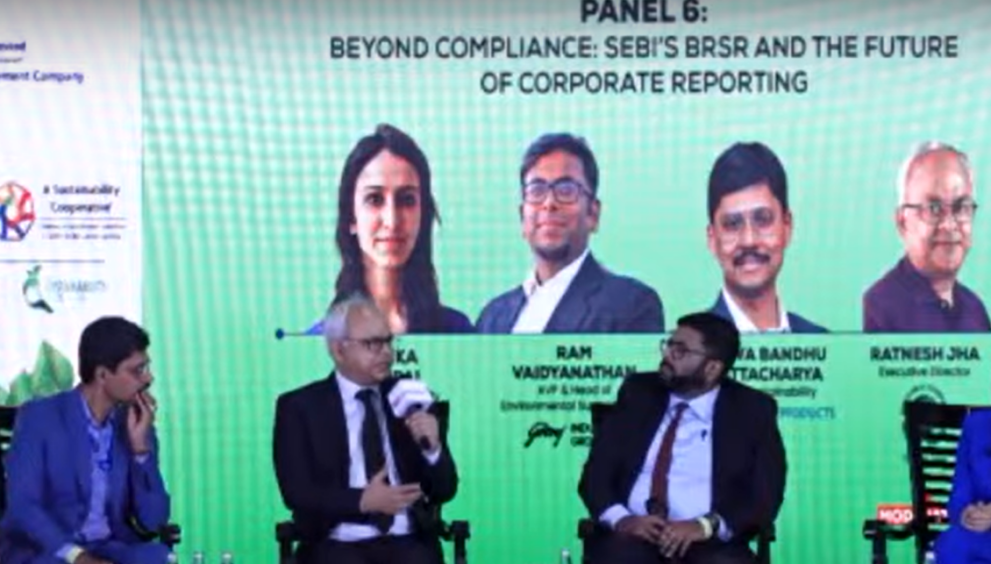SEBI’s BRSR Framework, Future Of ESG Reporting In India

Industry leaders discuss SEBI’s BRSR framework, moving corporate reporting beyond compliance to foster deeper ESG commitments, enhance transparency and drive sustainable business practices for India’s future
Mayank Badhwar
This session delves into the evolving role of corporate sustainability reporting, moving beyond compliance to a deeper commitment to Environmental, Social, and Governance (ESG) practices. Focusing on SEBI’s Business Responsibility and Sustainability Reporting (BRSR) framework, industry leaders will explore its impact on corporate transparency and sustainable practices. From pioneering efforts by Reliance Industries to Godrej and Tata’s data-driven approach, the discussion highlights best practices and the future of ESG reporting in India. The session was moderated by Ratnesh Jha, Executive Director, UN Global Compact Network India.
Ratnesh Jha, Executive Director, UN Global Compact Network India said, “ I lead this network, which now has over 500 voluntary members from the corporate sector. It originally began at the start of this century with just 60 members, as an initiative focused on corporate sustainability. This is part of a global movement that started with 10 key principles, with environmental protection as the major pillar. Other focus areas included labour laws, human rights, and anti-corruption.
What’s notable today is that these areas have become increasingly mandatory. Every week or month, we see new legislation being introduced somewhere in the world that raises the standards and challenges around global trade and supply chain integration. One of the key achievements we are proud of is the Business Responsibility and Sustainability Reporting (BRSR) framework, which has gained global recognition for its thorough implementation and contributions to advancing corporate sustainability.”
Mitika Bajpai, DGM Sustainability, Reliance Industries stated, “We’ve been publishing our Global Reporting Initiative (GRI) reports since 2004, long before sustainability became a buzzword. While there were existing frameworks back then, the introduction of the Business Responsibility and Sustainability Report (BRSR) has really streamlined things for me. It has made my day-to-day work much easier. What I truly appreciate about BRSR is that it’s tailored specifically for India, which is Important.
It’s important to understand the purpose behind reporting, it’s not just a checkbox exercise. It goes back to why we pursue sustainability in the first place. The real challenge lies in continuously improving and analysing year after year. You need to always think about what’s next and how to get better at it.”
Ram Vaidyanathan, AVP & Head, Environmental Sustainability, Godrej Industries Group, highlights two key takeaways from their adoption of the BRSR (Business Responsibility and Sustainability Reporting) framework.
Firstly, it enables India to generate rich, data-driven insights, positioning the country as a leading supplier of low-emission commodities to the global market. Secondly, he emphasises the importance of viewing MSMEs (Micro, Small and Medium Enterprises) as a competitive advantage. What is currently voluntary compliance will soon become mandatory. Therefore, the next five to ten years should be seen as an opportunity, not just for ESG strategy, but for shaping the future direction of businesses.
He also touches upon the challenges of building a sustainable supply chain, noting that the process is often categorised by complexity. However, MSMEs and B2B segments are relatively simpler to address, as many of these companies are already tracking significant amounts of relevant data.
Vishwa Bandhu Bhattacharya, Director, Sustainability, Tata Consumer Products, explained that the Business Responsibility and Sustainability Report (BRSR) was preceded by the Business Responsibility Report (BRR). If you compare the two, strong governance remains a constant. While both frameworks focused on governance principles, the key difference lies in the level of data maturity. BRR laid the groundwork, but BRSR brought in more sophisticated data reporting without compromising governance. It’s a natural progression.”






































































































































































































































































































































































































































































































































































































































































































































































































































































































































































































































































































































































































